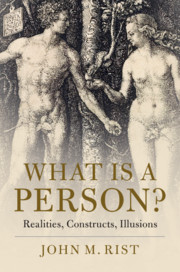Book contents
- What is a Person?
- What is a Person?
- Copyright page
- Contents
- Acknowledgments
- Introduction
- Part I Constructing the ‘Mainline Tradition’
- 1 The First Foundations: Plato and Aristotle
- 2 From Stoic Individuals and Personae to Christian Persons
- 3 Mixtures: Plotinus, Porphyry, Nemesius
- 4 Augustine’s Personae: Theology, Metaphysics, History
- 5 The Definition: Boethius and Richard of Saint Victor
- 6 Toward a Synthesis: Thomas Aquinas
- 7 Between Two Worlds: Duns Scotus
- Part II No God, no Soul: What Person?
- Part III Toward Disabling the Person
- Part IV Persons Restored or Final Solution?
- Epilogue or Epitaph?
- Appendix The World of Rights Transformed Again
- Bibliography
- Index
6 - Toward a Synthesis: Thomas Aquinas
from Part I - Constructing the ‘Mainline Tradition’
Published online by Cambridge University Press: 05 December 2019
- What is a Person?
- What is a Person?
- Copyright page
- Contents
- Acknowledgments
- Introduction
- Part I Constructing the ‘Mainline Tradition’
- 1 The First Foundations: Plato and Aristotle
- 2 From Stoic Individuals and Personae to Christian Persons
- 3 Mixtures: Plotinus, Porphyry, Nemesius
- 4 Augustine’s Personae: Theology, Metaphysics, History
- 5 The Definition: Boethius and Richard of Saint Victor
- 6 Toward a Synthesis: Thomas Aquinas
- 7 Between Two Worlds: Duns Scotus
- Part II No God, no Soul: What Person?
- Part III Toward Disabling the Person
- Part IV Persons Restored or Final Solution?
- Epilogue or Epitaph?
- Appendix The World of Rights Transformed Again
- Bibliography
- Index
Summary
After Richard of St Victor, it is reasonably safe to leave aside other medieval thinkers and move directly to Thomas Aquinas, whose treatment of persons, according to Spaemann, follows on in sequence from Richard’s but exhibits greater ‘perspicuity and clarity’.1 This, though true, may underestimate the importance of a change in the historical context of the two authors, for Richard was still living in a largely ‘pre-Aristotelian’, patristically determined world where human persons, as images and likenesses of God, were subjects of reflection with primary reference to the divine Persons. It is no accident that Richard, in the footsteps of Augustine, attended to persons in works principally devoted to Trinitarian theology while Boethius, though offering an Aristotelian-sounding definition of the person, published it in a rather technical treatise against Trinitarian heresies,
- Type
- Chapter
- Information
- What is a Person?Realities, Constructs, Illusions, pp. 62 - 69Publisher: Cambridge University PressPrint publication year: 2019



